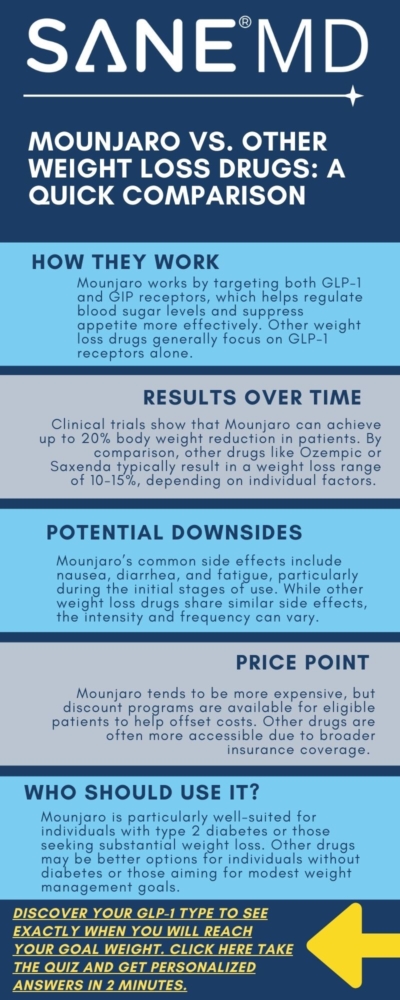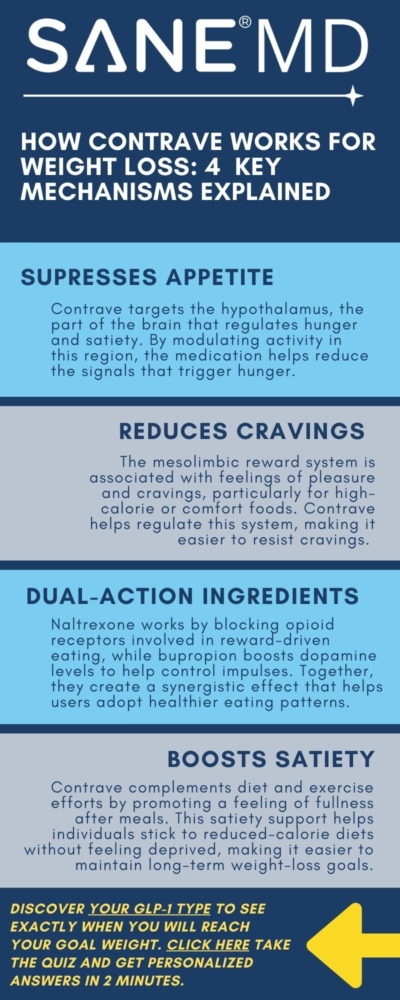Mounjaro vs. Other Weight Loss Drugs: Find Your Fit Quiz
The use of weight loss medications has gained significant attention in recent years as more people seek effective solutions to manage obesity and related health conditions. When considering Mounjaro vs other weight loss drugs, Mounjaro has emerged as a promising contender due to its dual-action mechanism, originally approved for type 2 diabetes but increasingly utilized for weight loss.
This article provides a detailed comparison of Mounjaro with other popular weight loss drugs, such as Ozempic, Wegovy, and Contrave, to help readers understand their differences and make informed decisions. For those unsure about which medication aligns with their needs, taking the weight loss drug type quiz can offer valuable insights tailored to individual circumstances.
Key Takeaways
- Mounjaro’s Role in Weight Loss: Mounjaro targets multiple pathways in the brain and body, helping to regulate appetite, slow digestion, and support sustainable weight management, which can help individuals lose weight.
- Comparison Highlight: While Mounjaro and other drugs like Ozempic, Wegovy, and Contrave share similar goals of promoting weight loss, their mechanisms, effectiveness, and potential side effects differ.
- The weight loss drug type quiz is a useful tool to identify which medication may be the best fit for individual health needs and goals.
What Is Mounjaro?
Mounjaro (tirzepatide) is a prescription medication originally approved by the FDA for managing type 2 diabetes. It belongs to a class of drugs known as GLP-1 receptor agonists but stands out because it also acts on GIP (glucose-dependent insulinotropic polypeptide) receptors.
This dual mechanism enhances its effectiveness in regulating blood sugar levels on par with and even better than some other diabetes medicines and addressing appetite control, making it unique among similar medications.
Although its primary indication is for diabetes, Mounjaro has shown significant promise for weight loss in clinical trials. Many healthcare providers now prescribe it off-label for this purpose, particularly for individuals struggling with obesity. Its effects on weight loss are attributed to its ability to:
- Reduce Appetite: Mounjaro influences hunger-regulating hormones in the brain, helping individuals feel full sooner and consume fewer calories.
- Slow Digestion: By slowing gastric emptying, the drug prolongs the sensation of fullness after eating.
- Regulate Blood Sugar Levels: Mounjaro enhances insulin sensitivity, contributing to overall metabolic improvements that support weight loss efforts.
In aiding weight loss, Mounjaro can also help lower high blood pressure.
However, Mounjaro is not suitable for everyone. Consulting a healthcare provider is essential to determine if it aligns with an individual’s health history and weight loss goals.
Certain medical conditions, such as a history of thyroid cancer or pancreatitis, may make it unsafe for use.
A thorough evaluation by a medical professional ensures that Mounjaro is prescribed appropriately, whether for diabetes management or weight loss.
Mounjaro vs Other Weight Loss Drugs: How Does Mounjaro Compare?
Mounjaro is one of several medications that have gained attention for aiding weight loss, but it differs significantly from other drugs in terms of its mechanism and target audience.
Below is a comparison of Mounjaro with some of the most popular weight loss medications currently available.
Ozempic (Semaglutide)
Ozempic, like Mounjaro, is a GLP-1 receptor agonist. Both medications help with weight loss by regulating hunger and slowing digestion.
However, Mounjaro’s additional action on GIP receptors distinguishes it from Ozempic, potentially amplifying its effects on appetite control and weight reduction.
- Effectiveness for Weight Loss: Studies suggest that Mounjaro may lead to greater weight loss than Ozempic due to its dual-action mechanism. However, individual responses vary.
- Similarities: Both medications help regulate blood sugar and reduce appetite, making them effective for people with obesity and type 2 diabetes.
- Differences: Mounjaro’s dual GLP-1 and GIP receptor activity may result in enhanced metabolic benefits, while Ozempic focuses solely on GLP-1 pathways.
For individuals deciding between these drugs, the weight loss drug type quiz can help identify the option based on your weight loss history and goals.
Wegovy (Semaglutide)
Wegovy is essentially a higher-dose formulation of semaglutide (the active ingredient in Ozempic) and is FDA-approved specifically for weight loss.
- Dosage and Results: Wegovy’s higher doses often result in more pronounced weight loss compared to Ozempic. Clinical trials have shown weight reductions of up to 15% of body weight in some participants.
- Comparison with Mounjaro: While Wegovy is designed exclusively for weight loss, Mounjaro’s dual-action mechanism may provide comparable or better results for certain individuals.
Contrave (Bupropion-Naltrexone)
Contrave takes a different approach to weight loss, targeting hunger and cravings rather than hormonal pathways. It combines bupropion, an antidepressant, and naltrexone, typically used for addiction treatment, to reduce food-related impulses.
- Distinct Mechanism: Unlike Mounjaro, which works on gut-brain signaling, Contrave modifies reward pathways in the brain, making it especially useful for individuals who struggle with emotional eating.
- Suitability: Contrave may be a better option for people who cannot tolerate GLP-1-based medications due to side effects or contraindications.
The weight loss drug type quiz can help those unsure whether a behavioral-focused drug like Contrave might be a better fit.
Phentermine/Topiramate (Qsymia)
Qsymia combines phentermine, a stimulant that suppresses appetite, with topiramate, an anticonvulsant that promotes satiety.
- Mechanism: Unlike Mounjaro’s hormonal approach, Qsymia’s stimulant properties lead to rapid appetite suppression, often resulting in quicker initial weight loss.
- Key Demographics: Qsymia may be more suitable for individuals without a history of cardiovascular issues, as stimulants can increase heart rate and blood pressure.
For those evaluating whether Mounjaro or Qsymia aligns better with their needs, the weight loss drug type quiz provides a practical starting point to explore compatibility.
Pros and Cons of Mounjaro vs Other Weight Loss Drugs
When evaluating weight loss drugs, it’s essential to consider both the advantages and drawbacks of each option.
Below, we outline the key pros and cons of Mounjaro and compare them with other popular medications like Ozempic, Wegovy, Contrave, and Qsymia.
Mounjaro Pros
- Dual Action on GLP-1 and GIP Pathways: Mounjaro stands out for its dual mechanism, which not only reduces appetite but also enhances metabolic functions through GIP receptor activation. This dual action can result in more substantial weight loss for some individuals.
- Positive Effects on Blood Sugar Regulation: Originally developed for managing type 2 diabetes, Mounjaro effectively regulates blood sugar levels, making it especially beneficial for individuals with obesity and concurrent diabetes.
- Greater Potential for Weight Loss: Clinical studies suggest that Mounjaro may lead to more significant weight loss compared to GLP-1-only medications like Ozempic.
Mounjaro Cons
- Side Effects: Commonly reported side effects include nausea, vomiting, and gastrointestinal discomfort, especially at the beginning of treatment. These side effects may lessen over time but can be challenging for some patients to tolerate.
- High Cost and Limited Insurance Coverage: Mounjaro is not FDA-approved for weight loss, so insurance coverage for off-label use can be limited. This makes it less accessible for individuals without substantial financial resources.
Other Drugs Pros and Cons
- Ozempic/Wegovy:
- Pros: Proven effectiveness for weight loss, with FDA approval for Wegovy as a dedicated weight loss drug.
- Cons: Higher doses of semaglutide in Wegovy can increase the likelihood of side effects such as nausea and fatigue.
- Contrave:
- Pros: Particularly effective for reducing cravings and emotional eating, making it suitable for individuals with behavioral triggers.
- Cons: May not result in as much weight loss as GLP-1-based drugs and carries potential side effects like headaches and insomnia.
- Qsymia:
- Pros: Rapid initial weight loss due to the stimulant effects of phentermine.
- Cons: Stimulant-related side effects, such as increased heart rate and blood pressure, may limit its use for individuals with cardiovascular concerns.
Each medication offers unique benefits and limitations. The choice between Mounjaro and other drugs depends on individual factors, such as weight loss goals, tolerance for side effects, and affordability.
For a personalized assessment, consider taking the weight loss drug type quiz and consulting a healthcare provider.
How to Choose the Right Weight Loss Drug
Selecting the right weight loss medication requires a personalized approach, as no single drug works equally well for everyone. Factors such as medical history, weight loss goals, and tolerance to potential side effects should guide the decision-making process.
For instance, individuals with type 2 diabetes may benefit from medications like Mounjaro, which also regulates blood sugar, while those struggling with emotional eating might find Contrave more effective.
Healthcare providers play a critical role in evaluating these factors and recommending appropriate treatments. They can help identify potential risks, such as contraindications for certain drugs, and monitor progress to ensure the chosen medication delivers the desired results safely.
Cost and Accessibility
Cost is a significant consideration when choosing a weight loss drug. Mounjaro, though highly effective for weight loss, is often prescribed off-label, meaning insurance may not cover its use for this purpose. The monthly cost of Mounjaro can range from $800 to $1,000 without insurance, making affordability a concern for many patients.
Other medications, like Wegovy and Ozempic, also carry high costs, often exceeding $1,000 per month. Contrave and Qsymia tend to be less expensive, typically costing between $100 and $300 per month, depending on insurance coverage.
To help reduce costs, manufacturers of these medications often provide savings cards or discount programs. These programs can significantly lower out-of-pocket expenses, but availability and eligibility vary.
Patients should consult their healthcare providers or pharmacists to explore available financial assistance options and ensure they choose a medication that fits both their medical needs and budget.
How to Take Mounjaro
Taking Mounjaro correctly is essential to minimize side effects and achieve the best possible results. The medication is administered as a subcutaneous injection, typically once a week, and should be taken on the same day each week for consistency.
- Start with a Low Dose: To help the body adjust, patients usually begin with a low dose of 2.5 mg per week. This initial dose is not intended for weight loss but to reduce the likelihood of side effects such as nausea or vomiting.
- Gradual Dose Increases: After four weeks, the dosage is gradually increased based on tolerance and healthcare provider recommendations. Common dose increments include 5 mg, 7.5 mg, and up to a maximum of 15 mg per week.
- Administration Tips: Mounjaro can be injected into the abdomen, thigh, or upper arm. Rotate injection sites weekly to avoid irritation. The injection can be taken with or without food.
Patients should follow their healthcare provider’s instructions closely to ensure the dosage schedule aligns with their weight loss or diabetes management goals. Regular follow-ups with a healthcare provider can help monitor progress and make necessary adjustments to the dosage or treatment plan.
By starting with a lower dose and gradually increasing it, users can enhance their body’s ability to tolerate the medication while optimizing its benefits for weight loss or blood sugar regulation.
Always store Mounjaro as directed, typically in the refrigerator, and use it only as prescribed.
FAQs about Mounjaro and other Weight Loss Drugs
Below, we answer common questions to help you understand how Mounjaro compares to other weight loss drugs and what might be the best fit for you.
1. What is better than Mounjaro for weight loss?
Determining whether a drug is better than Mounjaro for weight loss depends on individual factors, such as weight loss goals, medical history, and side effect tolerance. Wegovy (semaglutide) is FDA-approved specifically for weight loss and has shown users achieving up to 15-20% body weight reduction.
However, Mounjaro’s dual-action mechanism (GLP-1 and GIP receptor activation) may result in greater weight loss for some individuals, even though it is not yet approved solely for weight loss. Consulting with a healthcare provider can help determine which medication is better suited for your specific needs.
2. What is the most effective weight loss drug ever?
Clinical studies indicate that Wegovy (semaglutide) is currently among the most effective weight loss drugs, with some patients experiencing up to a 20% reduction in body weight. Mounjaro (tirzepatide) shows comparable or even better results in clinical trials, but it is not FDA-approved specifically for weight loss.
The effectiveness of a drug also depends on adherence to lifestyle changes, such as a reduced-calorie diet and increased physical activity, which amplify the results of these medications.
3. Do you lose more weight on Ozempic or Mounjaro?
Clinical trials indicate that Mounjaro leads to greater weight loss compared to Ozempic (semaglutide). Mounjaro’s dual-action mechanism targets both GLP-1 and GIP receptors, whereas Ozempic only activates GLP-1 receptors.
On average, users taking Mounjaro lost more weight than those taking Ozempic, but individual results vary. Both medications work best when combined with diet and exercise.
4. Is Wegovy or Mounjaro better for weight loss?
Wegovy is FDA-approved specifically for weight loss, making it a straightforward choice for individuals seeking a dedicated weight loss medication. Mounjaro, while primarily approved for diabetes, has shown greater weight loss in some studies due to its dual-action mechanism.
Deciding between the two depends on individual health needs, cost considerations, and potential side effects, which should be discussed with a healthcare provider.
5. How do I know which weight loss drug is right for me?
Choosing the right weight loss drug requires evaluating your medical history, weight loss goals, and tolerance for side effects. A healthcare provider can assess these factors and recommend the best option. Additionally, the weight loss drug type quiz can help with the decision.
Conclusion
Choosing the right weight loss medication is a highly individualized process, as each drug offers unique mechanisms, benefits, and potential drawbacks. Mounjaro stands out for its dual-action on GLP-1 and GIP receptors, providing significant weight loss and metabolic benefits for many users.
However, alternatives like Wegovy, Ozempic, Contrave, and Qsymia cater to specific needs and goals, whether it’s targeting emotional eating, reducing cravings, or managing blood sugar alongside weight loss.
While Mounjaro shows promise for weight loss, it may not be suitable for everyone due to side effects, costs, or medical contraindications. Consulting a healthcare provider is crucial to evaluate options and create a personalized treatment plan.
Additionally, tools like the weight loss drug type quiz can help identify options most aligned with your needs and lifestyle.
Ultimately, the journey to weight loss is about finding a sustainable solution that supports your overall health and well-being, and this article provides the insights you need to take the next step confidently.
How Contrave Works for Weight Loss: A Quiz to Determine if It’s Your Best Option
Contrave works for weight loss by targeting the brain’s appetite and reward centers to reduce hunger and control cravings. By helping regulate these pathways, it supports healthier eating habits. For optimal results, Contrave should be combined with a reduced-calorie diet and regular exercise (FDA Prescribing Information).
For those unsure whether Contrave might suit their needs, a weight loss drug type quiz can offer valuable guidance.
Key Takeaways
Contrave’s unique features and benefits include:
- A combination of bupropion and naltrexone for weight management.
- Mechanisms that target hunger and cravings through the brain’s reward system.
- Enhanced effectiveness when paired with a healthy diet and exercise.
What is Contrave?
Contrave is a prescription weight-loss medication that combines two active ingredients: bupropion and naltrexone. Bupropion is often used to treat depression as well as for smoking cessation, while naltrexone is commonly prescribed for addiction treatment. Together, these ingredients work to support weight loss by reducing appetite and controlling cravings.
It’s important to note that Contrave is not approved for treating depression, psychiatric disorders, or as a smoking cessation aid. Before starting Contrave, individuals should consult a healthcare provider to ensure the medication is appropriate for their medical history and current health needs.
How Contrave Works for Weight Loss
Contrave works by acting on two key areas of the brain:
- The Hypothalamus – This region regulates hunger and satiety. By altering its activity, Contrave helps suppress appetite.
- The Mesolimbic Reward System – This system influences pleasure and cravings. Contrave reduces the desire to eat for emotional or reward-driven reasons.
The combination of naltrexone and bupropion enhances satiety, reduces food intake, and promotes energy expenditure. While the exact neurochemical effects remain under study, these mechanisms are believed to help individuals achieve their weight loss goals.
Benefits of Contrave for Overweight and Obese Patients
Clinical research has demonstrated Contrave’s efficacy in aiding weight loss:
- Studies show that individuals who take Contrave alongside diet and exercise lose 2 to 4 times more weight than those relying on lifestyle changes alone.
- Nearly half of the participants in these studies lost at least 5% of their body weight.
Contrave is particularly effective when combined with lifestyle changes, such as a reduced-calorie diet and regular physical activity. By addressing both physical hunger and emotional cravings, it can serve as a valuable tool for individuals seeking long-term weight management. For those wondering if Contrave aligns with their goals, the weight loss drug type quiz can provide personalized insights.
Using Contrave with a Reduced-Calorie Diet
Contrave is most effective when paired with a reduced-calorie diet and increased physical activity. This combination ensures that users can maximize the medication’s benefits while adopting sustainable lifestyle changes.
Contrave acts as an adjunct therapy, meaning it supports individuals already making efforts to lose weight but struggling to see results. By enhancing satiety and reducing cravings, it helps individuals stay on track with their weight-loss journey.
Who is Contrave For?
Contrave is specifically designed for adults who are overweight or obese and are looking for an effective way to manage their weight. It is especially beneficial for those with a body mass index (BMI) of 30 or higher or for individuals with a BMI of 27 or higher who have a weight-related medical condition, like type 2 diabetes or high blood pressure.
Contrave is not just for anyone looking to shed a few pounds; it is intended for those who have struggled with weight loss through diet and exercise alone. It can be a valuable tool for those who need additional support to control cravings and reduce calorie intake.
However, it is essential to consult with a healthcare provider before beginning Contrave to ensure it aligns with your specific health needs and medical history. This is especially important for individuals with conditions like uncontrolled high blood pressure or a history of seizures, as Contrave may not be suitable for them.
Taking Contrave
To ensure safe and effective use of Contrave, it’s essential to follow these guidelines:
- Take as prescribed: Follow your healthcare provider’s instructions precisely.
- Avoid high-fat meals: Avoiding a high-fat meal is crucial because it can significantly increase drug levels in the body, raising the risk of adverse effects such as seizures.
- Opioid use: If you need to use opioid medication temporarily, inform your doctor, as Contrave’s naltrexone component can interfere with opioids.
- Storage: Keep Contrave at room temperature, away from moisture and heat.
By adhering to these recommendations, users can minimize risks and optimize the benefits of the medication.
Potential Side Effects
Like any medication, Contrave may cause side effects. Common and severe side effects include:
- Common side effects: Nausea, headache, dizziness, and dry mouth.
- Serious side effects: Seizures, severe headaches, or blurred vision.
There is an increased risk of seizures and other severe side effects, particularly in individuals with pre-existing vulnerabilities.
It’s crucial to watch for signs of an allergic reaction, such as swelling, hives, or difficulty breathing, and seek immediate medical attention if these occur. Because side effects vary between individuals, regular medical supervision is essential while using Contrave.
Drug Interactions
Contrave can interact with other medications, potentially altering their effectiveness. Key considerations include:
- Opioid medications: Naltrexone in Contrave can block the effects of opioids, reducing their efficacy.
- Monoamine oxidase inhibitors (MAOIs): Using MAOIs with Contrave is contraindicated due to the risk of hypertensive reactions.
- Other medicines: Inform your doctor of all other medicines you are taking, including prescription drugs, over-the-counter medicines, vitamins, and herbal products.
To ensure safety, discuss any potential drug interactions with a healthcare provider before starting Contrave.
Safety and Tolerability
Contrave carries certain risks, including:
- Boxed warnings: These highlight risks of suicidality and neuropsychiatric reactions associated with bupropion.
- Heart rate and blood pressure: Contrave may increase both, requiring regular monitoring.
- Seizure risk: Taking Contrave with high-fat meals significantly raises the risk of seizures.
By being aware of these risks, users can make informed decisions and work closely with their healthcare providers to monitor their response to the medication.
Efficacy of Contrave in Clinical Trials
Clinical trials have shown that Contrave can be a capable ally in the weight loss journey for overweight and obese patients. In these studies, participants who took Contrave in conjunction with a reduced-calorie diet and regular physical activity lost significantly more weight than those who relied on lifestyle changes alone. On average, individuals taking Contrave lost 2 to 4 times more weight compared to those who did not take the medication.
One of the key findings from these trials is that nearly half of the participants achieved a weight loss of at least 5% of their body weight. This level of weight loss can have meaningful health benefits, such as improved blood pressure, better control of blood sugar levels, and reduced risk of developing weight-related medical conditions.
The success of Contrave in these trials underscores the importance of combining the medication with a healthy diet and exercise. By addressing both physical hunger and emotional cravings, Contrave helps individuals stay committed to their weight loss goals and achieve sustainable results.
Cost and Accessibility
Contrave’s cost varies depending on insurance coverage and available savings programs. Some manufacturers offer discounts, making the medication more accessible to eligible patients. Additionally, free shipping options may be available through specific programs. For accurate pricing information, consult your healthcare provider or pharmacy.
Frequently Asked Questions about Contrave
Here, we address some of the most common questions about Contrave to assist you in making an informed choice.
What makes Contrave different from other weight loss medications?
Contrave is unique because it combines two active ingredients—bupropion and naltrexone—that target both hunger and cravings. This dual mechanism addresses both physical and emotional factors contributing to weight gain, setting it apart from other medications that may focus on just one aspect.
Can I take Contrave if I have other medical conditions?
Certain conditions, such as uncontrolled high blood pressure or a history of seizures, may make Contrave unsuitable. It’s vital to discuss your full medical history with a healthcare provider to determine if Contrave is safe and appropriate for you.
Does Contrave work for everyone?
Contrave’s effectiveness depends on individual factors, including adherence to a healthy diet and exercise plan. While many users achieve significant weight loss, it may not work equally well for everyone. Consulting with a healthcare provider can help set realistic expectations.
What should I do if I experience severe side effects?
If you experience severe side effects, such as a seizure or severe headache, contact your healthcare provider immediately. In emergencies, seek urgent medical attention to address any complications promptly.
How quickly do you lose weight on Contrave?
Many users start to see weight loss results within the first 12 weeks of taking Contrave, particularly when it’s used alongside a reduced-calorie diet and regular exercise. The amount of weight loss varies depending on individual factors such as adherence to lifestyle changes and overall health. Regular check-ins with your healthcare provider can help monitor your progress and adjust your treatment plan as needed.
What is the downside of Contrave?
The primary downsides of Contrave include potential side effects, such as nausea, dizziness, and a risk of seizures, especially when taken with high-fat meals. Additionally, it may not be suitable for individuals with certain medical conditions, such as uncontrolled hypertension or a history of seizures. Close monitoring by a healthcare provider is crucial to minimize risks and ensure safety during treatment.
What does Contrave do to your metabolism?
Contrave targets specific areas of the brain to help control hunger and cravings but does not directly increase metabolism. Its effects on weight loss come from reducing calorie intake and encouraging lifestyle changes rather than altering the body’s metabolic rate. Combining Contrave with a healthy diet and regular exercise can optimize its benefits for weight management.
How can I make my Contrave work better?
To maximize the effectiveness of Contrave, pair it with a reduced-calorie diet and regular physical activity. Avoid high-fat meals to reduce the risk of side effects, and follow your healthcare provider’s instructions closely. Maintaining a consistent routine, staying hydrated, and tracking your progress can also help improve your results over time.
Conclusion
Contrave offers a scientifically backed option for individuals struggling with weight management. By addressing both hunger and cravings, it can complement diet and exercise efforts. However, it’s not suitable for everyone, so consulting a healthcare provider is crucial. To explore if Contrave is a good fit for your weight-loss journey, consider taking the weight loss drug type quiz to gain personalized insights.
Could Mounjaro Be the Key to Your Weight Loss Success? Take the Quiz!
In the world of weight loss and diabetes management, finding a treatment that aligns with your personal health goals can be challenging. Mounjaro, a medication designed to mimic specific digestive hormones, offers an option that might be the right fit for you.
But how can you know for sure? Taking the Weight Loss Drug Type Quiz could provide valuable insights into whether this innovative treatment matches your needs.
Key Takeaways
- Dual-Action Mechanism: Mounjaro targets two receptors (GLP-1 and GIP), which may enhance blood sugar control and weight loss.
- Personalized Insights Available: Taking the Weight Loss Drug Type Quiz here can help determine if this dual-action medication aligns with your weight management goals and safety.
- Health Benefits Beyond Weight Loss: Mounjaro may lower HbA1c levels, reduce the risk of hypoglycemia, and improve overall metabolic health.
What is Mounjaro and How Does it Work?
Mounjaro is a medication that mimics the effects of two key hormones involved in digestion: glucagon-like peptide-1 (GLP-1) and glucose-dependent insulinotropic polypeptide (GIP). These hormones play a vital role in regulating blood sugar levels and supporting digestive processes.
The connection between the brain and the gut plays a significant role in understanding obesity and weight gain. This brain-gut interaction impacts weight regulation, appetite, and hunger through complex mechanisms involving genetics, microbiomes, and metabolic set points.
By acting like GLP-1 and GIP, Mounjaro helps improve blood sugar control, making it a valuable tool for managing type 2 diabetes. This dual-action mechanism not only aids in better glucose management but also supports weight loss, a critical factor in improving overall health.
Curious if Mounjaro aligns with your health goals? Take the quiz now to find out how this medication could play a role in your weight loss journey.
Mounjaro’s Mechanism of Action: Glucose Dependent Insulinotropic
What sets Mounjaro prescription medication apart from other medications is its dual-agonist mechanism, which targets two receptors simultaneously: GLP-1 and GIP. These receptors are critical in managing digestion, blood sugar levels, and appetite control.
By activating both, Mounjaro amplifies its impact on the body, making it a promising option for certain individuals managing type 2 diabetes and weight loss goals.
Researchers are exploring the complex factors that contribute to weight gain, specifically highlighting the connection between the brain and the gut, which plays a significant role in understanding appetite and metabolic processes.
This connection is crucial in understanding how Mounjaro’s dual-agonist mechanism can potentially manage weight and blood sugar levels.
This dual approach has been shown to result in greater weight loss compared to single-agonist medications. The combined stimulation of GLP-1 and GIP receptors helps optimize insulin production, slow digestion, and reduce hunger, contributing to a more beneficial and comprehensive weight management strategy.
Curious about how this innovative mechanism might fit into your weight loss journey? Take the quiz now to discover if Mounjaro could be the right option for you!
Benefits of Mounjaro for Type 2 Diabetes Management
Managing type 2 diabetes often requires a multi-faceted approach, and Mounjaro offers several key benefits to support this effort:
- Improved Blood Sugar Control: Mounjaro helps regulate blood sugar levels, reducing the risk of hypoglycemia (low blood sugar) and creating a more stable glucose profile.
- Support for Weight Loss: Weight loss is a crucial component of managing type 2 diabetes, and Mounjaro has been shown to help patients lose weight. This can lead to improved overall health and a lower risk of diabetes-related complications.
- Lower HbA1c Levels: Research indicates that Mounjaro can help lower HbA1c levels more effectively than many other diabetes medications, offering better long-term control over blood sugar.
Prolonged high blood sugar can lead to complications, including damage to the eyes, nerves, and kidneys, highlighting the importance of maintaining blood sugar levels.
With its dual action targeting blood sugar control and weight management, Mounjaro offers a unique option for individuals managing type 2 diabetes.
Curious about whether Mounjaro could fit your health goals? Take the quiz today to explore if this dual-action medication is right for you!
Improved Blood Sugar Control and Reduced Risk of Low Blood Sugar
Mounjaro is designed to provide benefits for those managing type 2 diabetes, particularly in maintaining stable blood sugar levels:
- Regulates Blood Sugar Levels: By mimicking GLP-1 and GIP hormones, Mounjaro helps regulate glucose levels more effectively, minimizing spikes and crashes that can complicate diabetes management.
- Reduces the Risk of Hypoglycemia: Hypoglycemia, or dangerously low blood sugar, can be a common challenge for individuals with diabetes. Mounjaro works to maintain a steadier balance, lowering the likelihood of such episodes.
- Improves Insulin Sensitivity: Enhanced insulin sensitivity means your body can use insulin more efficiently, reducing the strain on the pancreas and potentially lowering the risk of complications associated with type 2 diabetes.
Curious if these benefits align with your health goals? Take the Weight Loss Drug Type Quiz now to see if Mounjaro might be the right fit for your diabetes management plan.
Benefits of Mounjaro for Weight Loss
Mounjaro has been shown to aid in weight loss for individuals with type 2 diabetes. Clinical trials indicate that participants using Mounjaro experienced notable weight reductions, with some reporting losses of up to 21% of their body weight.
These results are linked to the medication’s dual action in mimicking the hormones GLP-1 and GIP, which are involved in regulating appetite and food intake.
How Mounjaro Can Help You Lose Weight
Mounjaro supports weight loss through several mechanisms:
- Reducing Hunger and Increasing Fullness: By mimicking GLP-1 and GIP, Mounjaro helps reduce hunger and increase feelings of fullness, making it easier to adhere to a healthy diet.
- Slowing Digestion: The medication slows the movement of food through the digestive system, which can help reduce overall calorie intake.
- Improving Insulin Sensitivity: Enhanced insulin sensitivity allows the body to use insulin more effectively, aiding in the reduction of blood sugar levels.
It’s essential to note that Mounjaro is not a quick fix for weight loss. It should be used in conjunction with a healthy diet and regular exercise.
Additionally, the weight loss effects of Mounjaro may vary from person to person, so it’s crucial to know your Weight Loss Drug Type (quiz here) and discuss your individual needs and expectations with your healthcare provider.
Comparison to Other Diabetes Medications
Mounjaro’s dual-agonist mechanism sets it apart from many other diabetes medications. Unlike GLP-1 receptor agonists that target only GLP-1, Mounjaro also mimics GIP (glucose-dependent insulinotropic polypeptide), which may contribute to its combined effects on blood sugar control and weight management.
Mounjaro is available in various strengths as a liquid solution in prefilled pens, with the appropriate dosage determined by a doctor’s prescription, ensuring that users receive the correct dosage for their specific needs.
This dual-action capability:
- Improves Blood Sugar Control: Mounjaro’s ability to act on both GLP-1 and GIP receptors may lead to better blood sugar regulation compared to medications that focus solely on GLP-1.
- Supports Greater Weight Loss: Studies suggest that Mounjaro may promote more weight loss than other diabetes medications, offering dual benefits for health and weight management.
If you’re exploring options for diabetes management, take the quiz today to discover if Mounjaro could be the right choice for your needs.
Mounjaro vs. Other GLP-1 Receptor Agonists
Mounjaro stands out among GLP-1 receptor agonists due to its unique dual-agonist mechanism of action.
While other medications in this class target only the GLP-1 receptor, Mounjaro also activates the GIP (glucose-dependent insulinotropic polypeptide) receptor.
This dual-action approach may offer significant advantages:
- Enhanced Blood Sugar Control: The combined stimulation of GLP-1 and GIP receptors allows Mounjaro to regulate blood sugar levels more effectively than single-agonist medications.
- Greater Weight Loss Potential: Research suggests that this dual mechanism could result in more substantial weight loss compared to medications that target only the GLP-1 receptor.
Wondering if this dual-action medication aligns with your weight management and health goals? Take the weight loss drug type quiz to find out if Mounjaro might be the right option for you!
Potential Side Effects of Mounjaro
Like any medication, Mounjaro comes with potential side effects, which can vary in severity. It’s important to understand these risks and consult your doctor if you experience any issues.
One potential serious side effect is inflammation of the pancreas, known as pancreatitis. Recognizing symptoms like vomiting and severe abdominal pain is crucial, and patients should stop using the medication and seek immediate medical attention if such symptoms occur.
Common Side Effects
- Mild to Severe Nausea
- Vomiting
- Diarrhea
- Abdominal Pain
These side effects are often mild and may improve over time as your body adjusts to the medication.
Serious Side Effects
- Severe Allergic Reactions: Symptoms may include difficulty breathing, rash, or swelling.
- Thyroid Tumors: Rare but serious, this risk should be discussed with your doctor.
- Pancreatitis: Signs include severe abdominal pain that may spread to your back.
It’s important to note that taking too much mounjaro increases the risk of side effects. If you experience any side effects, especially severe ones, it’s critical to contact your healthcare provider promptly. If you experience severe symptoms, call emergency services immediately.
Interested in learning whether Mounjaro could be the right option for your health and weight management journey? Take the weight loss drug type quiz to explore your options.
Who Should Not Use Mounjaro
While Mounjaro can be a helpful treatment for type 2 diabetes and weight loss, it is not suitable for everyone. Certain individuals should avoid using this medication due to potential risks and contraindications.
Contraindications for Mounjaro
Mounjaro is not recommended for people with:
- A history of medullary thyroid carcinoma (MTC) or multiple endocrine neoplasia syndrome type 2 (MEN 2)
- Type 1 diabetes
- A known allergy to tirzepatide or any other ingredients in Mounjaro
- A history of pancreatitis or other pancreatic disorders
- Severe gastrointestinal disease or a history of gastrointestinal surgery
It’s also important to note that Mounjaro has not been studied in children or adolescents, and its safety and efficacy in these populations have not been established.
Always consult your healthcare provider to determine if Mounjaro is a safe and appropriate treatment for your specific health conditions.
Administration and Dosage
Mounjaro is administered as a weekly subcutaneous injection, offering a convenient dosing schedule for individuals managing type 2 diabetes and weight loss goals.
Key Points to Remember:
- Weekly Injections: Mounjaro is injected under the skin once a week, making it manageable for most patients.
- Individualized Dosage: The exact dosage will vary based on your specific health needs and your doctor’s recommendations. Adjustments may be made over time to optimize results.
- Follow Medical Guidance: Always follow the instructions provided by your healthcare provider to ensure safe and effective use. It is crucial to consult with your doctor regarding specific health issues and potential drug interactions before starting treatment with Mounjaro.
Not sure if this method suits your lifestyle or needs? Take the weight loss drug type quiz to explore whether Mounjaro is a potential fit for your health journey.
Interactions with Other Medications
Before starting Mounjaro, it’s essential to review your current medications with your healthcare provider, as this treatment may interact with other drugs or substances.
Various substances, including foods, alcohol, and medications, can interfere with the effectiveness of Mounjaro. Understanding these interactions is crucial, as they can lead to diminished drug efficacy or increased side effects. Always consult your healthcare provider regarding any potential interferences.
Possible Interactions:
- Diabetes Medications: Using Mounjaro with other diabetes treatments may increase the risk of low blood sugar (hypoglycemia).
- Birth Control Pills: Some hormonal contraceptives may be affected by Mounjaro’s action.
- Certain Antibiotics: Interactions with specific antibiotics could alter how Mounjaro or the antibiotic functions.
- Drink Alcohol: Drinking alcohol while undergoing Mounjaro treatment may increase the risk of side effects and hypoglycemia in individuals with diabetes. Consult your doctor to determine safe alcohol consumption levels during treatment.
To minimize risks, discuss all prescription and over-the-counter medications, as well as supplements, with your doctor before starting Mounjaro.
Special Considerations
Mounjaro may not be suitable for everyone. It’s crucial to consider your medical history and discuss any potential concerns with your healthcare provider.
Key Considerations:
- Pre-existing Conditions: Patients with conditions such as high blood pressure or kidney disease may need alternative treatments.
- Pregnancy and Breastfeeding: Mounjaro is not recommended for individuals who are pregnant or breastfeeding due to potential risks to the baby.
Your doctor will evaluate whether Mounjaro is a safe and effective choice based on your unique circumstances.
Still unsure if this medication suits your needs? Take the weight loss drug type quiz to gain personalized insights and guidance.
Cost and Accessibility of Mounjaro
Mounjaro can be a costly medication, and its accessibility may vary depending on your insurance coverage and location.
Understanding the financial aspects of this treatment is crucial for making an informed decision.
Affordability and Availability of Mounjaro
The cost of Mounjaro can range from several hundred to several thousand dollars per month, depending on the dosage and frequency of use.
However, there are several programs and resources available to help make Mounjaro more affordable:
- Manufacturer Discounts and Savings Programs: Many pharmaceutical companies offer discounts and savings programs to help reduce the cost of medications.
- Patient Assistance Programs (PAPs): These programs provide financial assistance to eligible patients who cannot afford their medications.
- Government Programs: Medicare and Medicaid may cover part or all of the cost of Mounjaro for eligible individuals.
- Private Insurance Coverage: Check with your insurance provider to understand your coverage options and any potential out-of-pocket costs.
It’s essential to discuss your insurance coverage and financial situation with your healthcare provider to determine the best course of treatment for your individual needs.
FAQ: Common Questions About Mounjaro
When considering a medication like Mounjaro, it’s natural to have questions.
Below are answers to some of the most frequently asked questions, helping you better understand whether Mounjaro could be a suitable choice for managing your health and weight goals.
1. What is Mounjaro used for?
Mounjaro is a medication prescribed to help manage type 2 diabetes. It works by improving blood sugar control and promoting weight loss.
By mimicking two key digestive hormones, it regulates blood sugar levels and reduces appetite, offering dual benefits for metabolic health.
2. What are the most common side effects of Mounjaro?
The most common side effects of Mounjaro include nausea, vomiting, diarrhea, and abdominal pain. These symptoms are often mild and tend to decrease as your body adjusts to the medication.
However, if side effects persist or worsen, consult your healthcare provider for guidance.
3. Why should I take the weight loss drug type quiz?
The weight loss drug type quiz provides a personalized way to explore whether Mounjaro aligns with your weight management and health goals.
By evaluating your weight control history and preferences, the quiz offers tailored insights to help you make an informed decision about whether this treatment might be right for you.
4. How does Mounjaro compare to other diabetes medications?
Mounjaro’s dual-agonist mechanism distinguishes it from other diabetes medications. In addition to targeting the GLP-1 receptor, Mounjaro also activates the GIP receptor, which may improve its ability to regulate blood sugar and support weight loss.
This dual action provides a broader approach to managing type 2 diabetes.
5. Is Mounjaro suitable for pregnant or breastfeeding women?
Mounjaro is not recommended for use during pregnancy or while breastfeeding due to potential risks to the baby. If you are pregnant, breastfeeding, or planning to become pregnant, consult your doctor to explore alternative treatment options that are safer for you and your child.
Conclusion
Mounjaro offers a promising option for individuals managing type 2 diabetes and those seeking to improve their overall health through weight loss. Its dual-agonist mechanism and ability to regulate blood sugar and appetite make it a valuable choice among diabetes medications.
However, like any treatment, Mounjaro may not be suitable for everyone, which is why understanding your individual needs is so important.
The weight loss drug type quiz can help you determine if Mounjaro aligns with your health goals by providing personalized insights based on your history and preferences. Armed with this knowledge, you’ll be better equipped to make informed decisions and work with your doctor to find the best path forward.
If you’re ready to take the next step in your health journey, don’t wait—take the quiz today and explore whether Mounjaro might be the key to achieving your goals.




















